On Jan. 15, 2019, the U.S. Occupational Safety and Health Administration issued a notice announcing another increase in the maximum penalty amounts for violations of federal Occupational Safety and Health standards and regulations. Under the new structure, the maximum penalty for “Willful” or “Repeated” violations is $132,598. Moreover, the maximum penalty for “Failure to Abate” violations is $13,260 per day after the abatement date. Finally, the maximum penalty allowed for “Serious,” “Other-Than-Serious,” and “Posting Requirements” violations is $13,260. In addition, states that operate their own Occupational Safety and Health plans are required to adopt maximum penalties levels that are at least as effective as federal OSHA’s.
The Federal Civil Penalties Inflation Act Improvements Act of 2015 (Inflation Adjustment Act) requires OSHA to adjust its maximum monetary penalty levels to account for inflation no later than Jan. 15 of each year. Adjustments are made by issuing a final rule, which becomes effective when it is published in the Federal Register. However, due to a lapse in funding for the Office of the Federal Register as a result of the government shutdown, publication of the Inflation Adjustment Act for 2019 has been delayed. OSHA has made available a pre-published version of the final rule, but again, the rule will not go into effect until it is published, and the increased penalty levels will only apply to penalties assessed after the effective date of the increase.
Despite the delay in publication, it is important for employers to be cognizant of these increases. While, in some circumstances, it might seem like an attractive option to simply accept a “Serious” penalty and pay the $13,260 fine instead of paying to challenge the citation, such instant gratification could pose issues for an employer down the road. This is particularly clear where the timeframe for challenging a citation is small, making the business decision on whether to challenge the citation that much more difficult. However, it is important to consider the following: while the maximum penalty for a “Repeated” violation is $132,598, in the next few years, the maximum penalty could reach over $150,000 after inflation adjustments are applied. Moreover, it is not unheard of for an employer to have multiple violations at one time. Multiple penalties at $132,598, let alone any other penalty after inflation, could have drastic effects for a business. Therefore, it is imperative that employers consciously weigh the potential exposure the inflated rates may pose in the future when considering whether to challenge “Serious” violations today.




 />i
/>i

